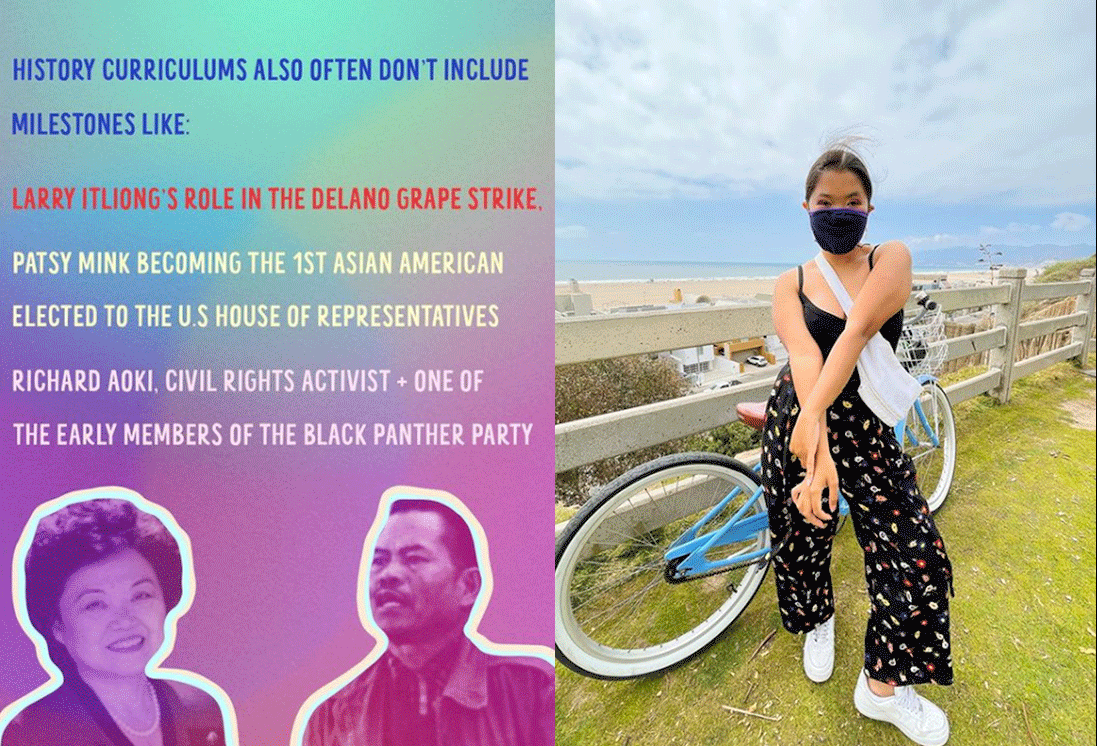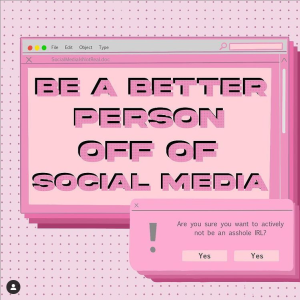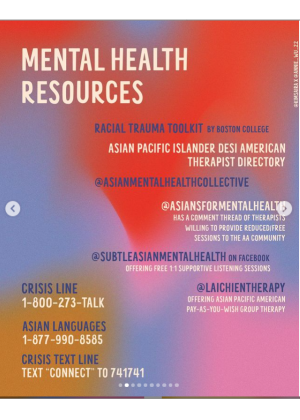Activist and Artist Kim Saira on Social Justice and Social Media

One of Kim Saira's Instagram resource designs (left) and activist and artist Kim Saira (right). (Courtesy of Kim Saira)
Technology has profoundly changed activism. Some of the biggest social justice movements over the past decade were born online — from #MeToo, a call for women to share stories of their experiences with misogyny and violence; the #OscarsSoWhite campaign to encourage more diversity in Hollywood; and #BlackLivesMatter, which shed light on the many unjust deaths of Black people at the hands of law enforcement and others. Digital tools like social media, bystander video recordings, and crowdfunding have proven to be some of the fastest and most effective ways to start a movement, create awareness, and raise money.
Asian American artist Kim Saira has used her background in design to play a part in many of these movements, particularly through her platform, on Instagram (@kimsaira). Her work aims to amplify activist messages, assist organizations in need, and direct the platform’s politically engaged users to helpful resources through easily shareable and eye-catching artwork. Saira’s work has been shared by prominent activist organizations like sustainability brand CHNGE and celebrities like Asian American actress Olivia Munn, helping promote mental health causes, anti-racism, gun reform, pay equity, and more.
In a conversation with Asia Blog, Saira discusses how she got her start in activism, the benefits and drawbacks of social media, and more. The interview has been lightly edited for clarity.
Did you always know that your design and art background could be useful in the social justice/activism space? What prompted you to try and combine the two?
It didn’t occur to me at first. Art has always just been a creative and therapeutic outlet for me to express my feelings. But as I was educating myself about topics like racism and social injustice, I knew I wanted to start speaking out about recent events that were occurring, so one of the best ways for me to do that was expressing it through what felt natural to me, which is art.

Social media, especially Instagram, has often been criticized for being fake or empty — people post things that aren't really authentic to how they are really living their lives. Instagram has also proven to be a very toxic place for many creators of color. Why do you think the platform still has become an important tool for activists?
I still feel that social media, like Instagram, can come with a layer of "filter" and "fakeness" that has been so normalized. However, I think that Instagram is a great way for communicating a message. It can be used as a way to get people to pay attention and read important information. It has been effective for activists to educate, to get points across, and to tell people what is happening in the outside world. At the end of the day, as toxic as it can be, social media is what you make of it, and using it as a tool for activists has also proven that it can be used for good.
Performative activism on social media is also something that has attracted a lot of criticism. What would your response be to people who say that posting about injustice isn't really helping? At what point do posts about injustice stop being helpful?
I tell my audience regularly that social media posts are literally just posts. Instagram, for example, can only fit 10 slides into a graphic — there is no way I can fit everything you need to know about a certain racial or social topic in 10 slides. Social justice and activism posts on Instagram are meant to be instant and to provoke people to do their own deeper research and create change in the real world. They are meant to be the starting point to your education, not the end. If a post about injustice can provoke a viewer to speak to their families or friends, then I think it means that it is helpful and that there is some change happening. But a post isn't helpful if people are viewing it, liking it, but aren't making any real-world changes in their day-to-day lives.

Anti-Asian violence has had a profound impact on many people in the AAPI community. Where do you find your inspiration or drive to keep working during sad or difficult times?
Personally, the anti-Asian violence has been incredibly difficult for me to come to terms with and process every day. However, there are so many important Asian Americans who give me inspiration, and I look up to them as role models. They remind me that Asian Americans have so much strength and resilience. It also helps to have a community of Asian Americans that I can constantly check up with about our fears, struggles, and mental health. Lastly, I also have an Asian American therapist that keeps my mental health in check and has helped me a lot, especially during difficult days.


